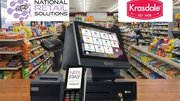News
ParTech remakes, re-brands itself with software, self-serve and proven hardware
The company best known for its durable terminals is in the midst of recreating itself as a creative and aggressive software- and services- house.
August 29, 2010
Executives at of ParTech, Inc. are remaking the company, broadening its product mix from its long time specialty of tough kiosk hardware for the hospitality sector into a firm that markets software and other solutions for a mix of retailers.
The firm's sturdy platform is its ordering and payment hardware for fast food, fast-casual and table-service restaurants: the PAR EverServ 6000 series, including a standard version, a smaller LP version, and a kiosk, along with the less-expensive EverServ2000.
The competition is formidable. ParTech's parent, Par Technology Corp., reported second quarter revenues of $56.2 million, compared with industry giant NCR Corp. with $1.2 billion, and Micros Systems with $248 million in revenues in its fiscal fourth quarter ending June 30.
Though its parent doesn't break out numbers by division, executives says ParTech generates about 60 percent of the revenues of New Hartford, N.Y.-based Par Technology which also provides computer system design for the Defense Department and logistical support for the transportation industry.
Despite the heavy competition, ParTech can boast of a client roster that includes McDonald's, Yum Brands, Red Lobster, Pizza Hut, and Legal Sea Foods. It has recently moved into movie theaters with Loews Cineplex, and cruise lines with Carnival.
It has more than 330,000 terminals in 50,000 locations, and its point-of-sale software is used in more than 15,000 restaurants.
ParTech's equipment is built to last. That's been great for the firm's reputation but it means there hasn't been a lot of turnover and that profit margins could be better, said president A. Edwin Soladay.
Improving margins was the primary reason Par Technology about 18 months ago brought in Soladay, a veteran in retail technology with Fujitsu. His charge was to design a more nimble firm with a fresh approach. Soladay remade some of the executive ranks, including hiring Peter T. Wolf as chief marketing officer.
The new team has been changing ParTech, investing in its software and service solutions, all the while continuing to deliver reliable hardware.
The new approach has been dubbed Boundless Hospitality, and the firm is branding itself as ‘PAR' for passion, accountability, and relationships.
"We're providing services around the hardware such as installation, program management, a help desk, and data reporting. It's a total package," says Soladay.
The timing is promising in the hospitality sector. Consumers and restaurants are changing, seeking greater self-serve and more personalization. Consumers want to try new things and restaurants want to be able to quickly change their menus. Meanwhile technology like mobile phones offer greater communication between consumers and restaurants, and open up marketing opportunities with loyalty programs.
This, combined with the diversification into new verticals, has meant record setting revenues in the first half of the year, said Soladay.
One recent success was the implementation with two clients of its PAR EverServ POS software for the quick-service industry. Both clients used Par Tech hardware.
Franchised burger spot Carl's Jr. this summer began using the EverServ software with the 6000 terminals in its Las Vegas restaurant and plans to roll it out to 37 more by the end of the year. San Antonio, Texas-based SIP Coffee House also is using EverServ with the 6000 and the smaller 6000 LP. Implementation from planning process to go-live took less than two months for Carl's and SIP, according to ParTech. PAR also works with its QSR clients to test new ways to interact with customers. Some experiments work – kiosks providing nutritional information – and some need more work – customer self-ordering through kiosks.
A hybrid approach where an assistant helped the customer to use the kiosk led to confusion on order flow so that idea must be rethought, said Wolf. But the concept remains a top goal because it offers greater up-sell opportunities, he says.
"People feel more comfortable adding items, say super-size or cheese, when ordering from a kiosk than with a human," says Wolf.
PAR reported a winner in self-serve in the arena space in February at the Molson Hockey House during the 2010 Winter Olympics in Vancouver, Canada. PAR and its partners deployed 14 EverServ 2000 terminals with touchscreens where game fans could use their Visa cards to buy tickets redeemable for wine, beer and hard liquor.
Two terminals were manned for cash-paying customers but 12 self-serve screens did the bulk of the business. By the time the games ended (and Canada beat the U.S. for the gold) the terminals had processed more than 125,000 drink units to more than 45,000 consumers.
Another test that worked was the use of various handhelds in the fast-casual space where the waiter/assistant can conduct food ordering, and when the meals done, pay-at-the table. "That is starting to take off," says Soladay.
For Soladay the first part of changing the company was raising its revenues and profit margins. In the next two years the goal is to grow firm's profile, strengthen its customer base and expand into specialty retail, grocery and c store. Soladay is also open to acquisitions.
The strategy is to use the firm's foundation to "springboard to Boundless Hospitality," says Soladay.
Full-Service ProvidersNorth AmericaReturn on InvestmentTouchscreensSuccessful Kiosk ProjectsRetailRestaurants
 ChatGPT
ChatGPT Grok
Grok Perplexity
Perplexity Claude
Claude










